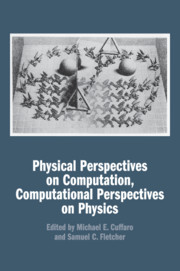Book contents
- Frontmatter
- Contents
- Figures
- Tables
- Contributors
- Preface
- Introduction
- Part I The Computability of Physical Systems and Physical Systems as Computers
- 1 Ontic Pancomputationalism
- 2 Zuse’s Thesis, Gandy’s Thesis, and Penrose’s Thesis
- 3 Church’s Thesis, Turing’s Limits, and Deutsch’s Principle
- Part II The Implementation of Computation in Physical Systems
- 4 How to Make Orthogonal Positions Parallel: Revisiting the Quantum Parallelism Thesis
- 5 How is There a Physics of Information? On Characterizing Physical Evolution as Information Processing
- 6 Abstraction/Representation Theory and the Natural Science of Computation
- Part III Physical Perspectives on Computer Science
- 7 Physics-like Models of Computation
- 8 Feasible Computation: Methodological Contributions from Computational Science
- 9 Relativistic Computation
- Part IV Computational Perspectives on Physical Theory
- 10 Intension in the Physics of Computation: Lessons from the Debate about Landauer’s Principle
- 11 Maxwell’s Demon Does not Compute
- 12 Quantum Theory as a Principle Theory: Insights from an Information-Theoretic Reconstruction
- Bibliography
- Index
7 - Physics-like Models of Computation
Published online by Cambridge University Press: 17 May 2018
- Frontmatter
- Contents
- Figures
- Tables
- Contributors
- Preface
- Introduction
- Part I The Computability of Physical Systems and Physical Systems as Computers
- 1 Ontic Pancomputationalism
- 2 Zuse’s Thesis, Gandy’s Thesis, and Penrose’s Thesis
- 3 Church’s Thesis, Turing’s Limits, and Deutsch’s Principle
- Part II The Implementation of Computation in Physical Systems
- 4 How to Make Orthogonal Positions Parallel: Revisiting the Quantum Parallelism Thesis
- 5 How is There a Physics of Information? On Characterizing Physical Evolution as Information Processing
- 6 Abstraction/Representation Theory and the Natural Science of Computation
- Part III Physical Perspectives on Computer Science
- 7 Physics-like Models of Computation
- 8 Feasible Computation: Methodological Contributions from Computational Science
- 9 Relativistic Computation
- Part IV Computational Perspectives on Physical Theory
- 10 Intension in the Physics of Computation: Lessons from the Debate about Landauer’s Principle
- 11 Maxwell’s Demon Does not Compute
- 12 Quantum Theory as a Principle Theory: Insights from an Information-Theoretic Reconstruction
- Bibliography
- Index
Summary
- Type
- Chapter
- Information
- Publisher: Cambridge University PressPrint publication year: 2018



